KSHM dhe Organizatat e mediave: Ndalimi i TikTok-ut në Shqipëri kërcënim për lirinë e shprehjes përpara zgjedhjeve!
Këshilli Shqiptar i Medias, së bashku me shumë organizata të tjera, vendase e të huaja, jnaë shprehur publikisht lidhur me vendimin e Këshillit të Ministrave të Shqipërisë më 6 mars 2025 për të pezulluar aksesin në platformën TikTok në shkallë kombëtare për 12 muaj. Duke e mriëkuptuar synimin e pohuar të qeverisë për të mbrojtur fëmijët nga përmbajtjet e dëmshme dhe për të siguruar mbrojtjen e të dhënave personale, theksojmë me forcë se masa të tilla mbrojtëse duhet të respektojnë plotësisht të drejtat themelore të njeriut, veçanërisht lirinë e shprehjes, aksesin në informacion dhe procesin e rregullt ligjor.
Liria e shprehjes dhe proporcionaliteti
Theksojmë se ndalimi i plotë i një platforme përfaqëson një kufizim ekstrem të së drejtës për lirinë e shprehjes dhe aksesin në informacion. Pezullimi në tëresi i një platforme të tërë tejkalon ndjeshëm parimin e proporcionalitetit, duke ndikuar në shprehjen legjitime të të gjithë përdoruesve dhe duke kufizuar debatin publik si dhe aksesin në burime të ndryshme informacioni.
Zgjidhje alternative të synuara, si moderimi i përmbajtjes, verifikimi i moshës dhe programe të përmirësuara të edukimit të përdoruesve, duhet të ishin shqyrtuar përpara se të vendosej një ndalim i përgjithshëm. Natyra e gjerë e kësaj mase krijon një precedent të rrezikshëm për ndërhyrjen joproporcionale të shtetit në të drejtat digjitale.
Si një vend kandidat për anëtarësim në BE, Shqipëria pritet të respektojë standardet evropiane për shtetin e së drejtës dhe liritë themelore. Kuadri ligjor i Aktit për Shërbimet Digjitale (DSA) të BE-së thekson llogaridhënien e platformave dhe transparencën në moderimin e përmbajtjes përmes një qasjeje të bazuar në analizën e riskut dhe proporcionalitet. DSA favorizon bërjen e platformave përgjegjëse për menaxhimin e risqeve në shërbimet e tyre, në vend që të ndëshkojë përdoruesit duke mbyllur platformat. Ne inkurajojmë Shqipërinë të harmonizojë qasjen e saj me këtë paradigmë.
Shqetësimet lidhur me procedet demokratike dhe zgjedhore
Me afrimin e zgjedhjeve parlamentare në maj 2025, momenti i këtij pezullimi është veçanërisht shqetësues. TikTok është shndërruar në një platformë në rritje për komunikimin politik dhe angazhimin e votuesve, veçanërisht për të rinjtë, votuesit për herë të parë dhe partitë politike apo lëvizjet e reja, të cilat argumentojnë se do të preken në mënyrë joproporcionale.
Duke kufizuar aksesin në këtë platformë, qeveria rrezikon të shtypë këto zëra në zhvillim, të dobësojë pluralizmin politik dhe të krijojë një efekt frikësues që mund të shtrihet përtej përdoruesve të TikTok-ut, duke ndikuar gazetarët, krijuesit digjital, aktivistët e shoqërisë civile dhe organizatat monitoruese të procesit demokratik.
Procesi i Rregullt Ligjor dhe Transparenca
Vëmë re se ky vendim pason njoftimin publik të Kryeministrit Rama në dhjetor 2024, ku ai përmendi konsultime me një grup të përzgjedhur prindërish dhe arsimtarësh. Megjithatë, ende mungojnë prova të mjaftueshme publike mbi shtrirjen, përfaqësueshmërinë dhe rezultatet e këtyre konsultimeve.
Theksojmë se vendime të kësaj shkalle dhe rëndësie duhet të bazohen në konsultime të plota, transparente dhe gjithëpërfshirëse, duke përfshirë organizatat e shoqërisë civile, organizatat mediatike, industrinë, avokatët e të drejtave digjitale dhe komunitetet e prekura.
Rreziqet e krijimit të një precedenti të rrezikshëm
Shprehim shqetësimin tonë se zbatimi i një ndalimi të përgjithshëm të një platforme krijon një precedent alarmues për Shqipërinë dhe rajonin. Kur qeveritë pretendojnë autoritet të gjerë për të mbyllur platforma popullore për shkak të shqetësimeve mbi përmbajtjen, ato rrezikojnë të hapin rrugën për kufizime të mëtejshme, duke kërcënuar lirinë e internetit në mënyrë më të gjerë.
U bëjmë thirrje autoriteteve shqiptare të shmangin krijimin e një precedenti të tillë dhe të sigurojnë që në të ardhshme aspektet e rregullimit të përmbajtjes në platformat digjitale të trajtohen përmes masave të specifike për grupe të ndryshme, të bazuara në evidenca dhe në përputhje me parimin e proporcionalitetit.
Rekomandime
I bëjmë thirrje qeverisë shqiptare të shfuqizojë menjëherë pezullimin e TikTok-ut dhe të nisë një proces konsultimi gjithëpërfshirës dhe transparent, duke përfshirë parlamentin, shoqërinë civile, organizatat mediatike, avokatët e të drejtave digjitale dhe partnerët ndërkombëtarë.
Ky proces konsultimi duhet të synojë zhvillimin e një kuadri rregullator proporcional dhe të bazuar në evidenca, në përputhje me standardet evropiane, veçanërisht Aktin e BE-së për Shërbimet Digjitale (DSA). Një qasje e tillë do t’i mundësojë Shqipërisë të adresojë në mënyrë efektive shqetësimet legjitime mbi sigurinë e fëmijëve dhe mbrojtjen e të dhënave, duke garantuar plotësisht lirinë e shprehjes, diskursin demokratik dhe procesin e rregullt ligjor të cilat janë elemente thelbësore në kontekstin e zgjedhjeve të ardhshme.
Rrjeti SafeJournalists
Shoqata e Gazetarëve të BH
Shoqata e Gazetarëve të Kosovës
Shoqata e Gazetarëve të Maqedonisë së Veriut
Shoqata e Gazetarëve të Kroacisë
Shoqata e Gazetarëve të Pavarur të Serbisë
Sindikatat e Media të Malit të Zi
Partnerët e Media Freedom Rapid Response:
Qendra Evropiane për Lirinë e Shtypit dhe Medias (ECPMF)
Federata Evropiane e Gazetarëve (EFJ)
Instituti Ndërkombëtar i Shtypit (IPI)
Shtypi i lirë i pakufizuar (FPU)
Osservatorio Balcani Caucaso Transeuropa (OBCT)
Organizata të tjera të shoqërisë civile
Qendra Shkencë dhe Inovacion për Zhvillim (SCiDEV)
Asociacioni i Gazetarëve të Shqipërisë (AGSH-AJA)
Qendra Shqiptare për Gazetari Cilësore (ACQJ)
Rrjetit Ballkanik të Gazetarisë Investigative në Shqipëri (BIRN Albania)
Këshilli Shqiptar i Medias
Res Publica
Citizens.al
Qendra MediaLook
Instituti për Demokraci dhe Ndërmjetësim (IDM)
Qendra për Mbrojtjen e të Drejtave të Fëmijëve në Shqipëri (CRCA-ECPAT)


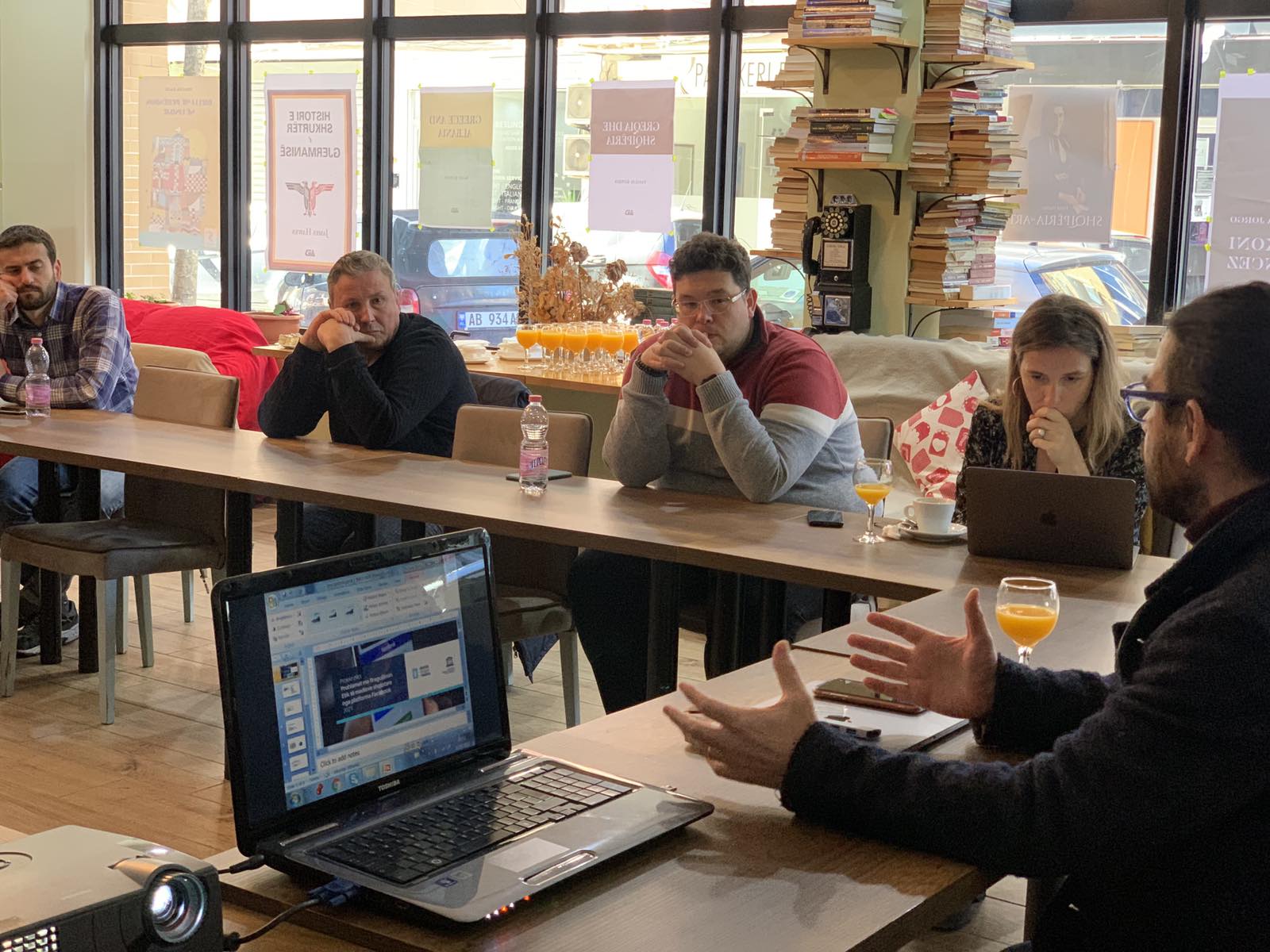
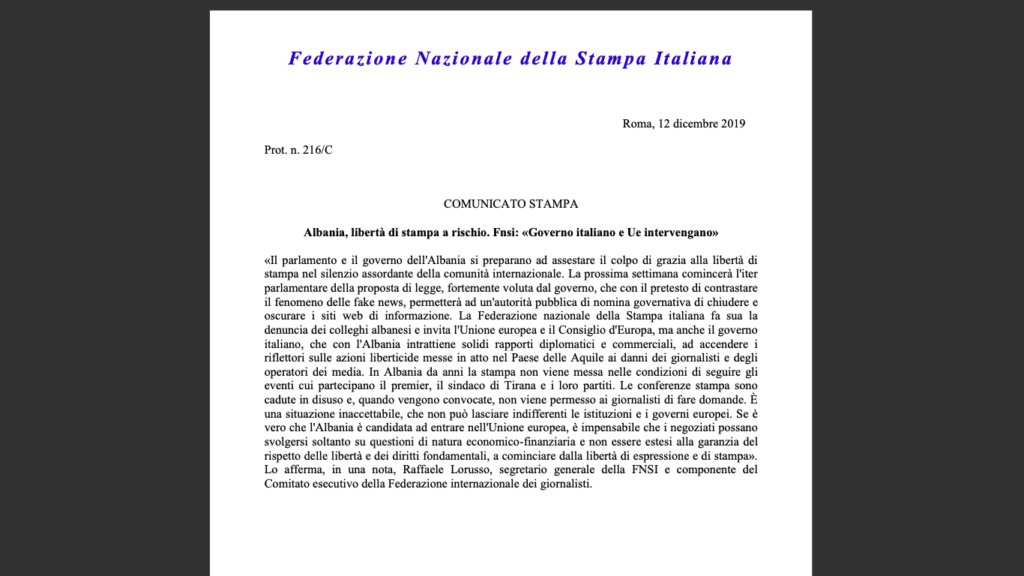



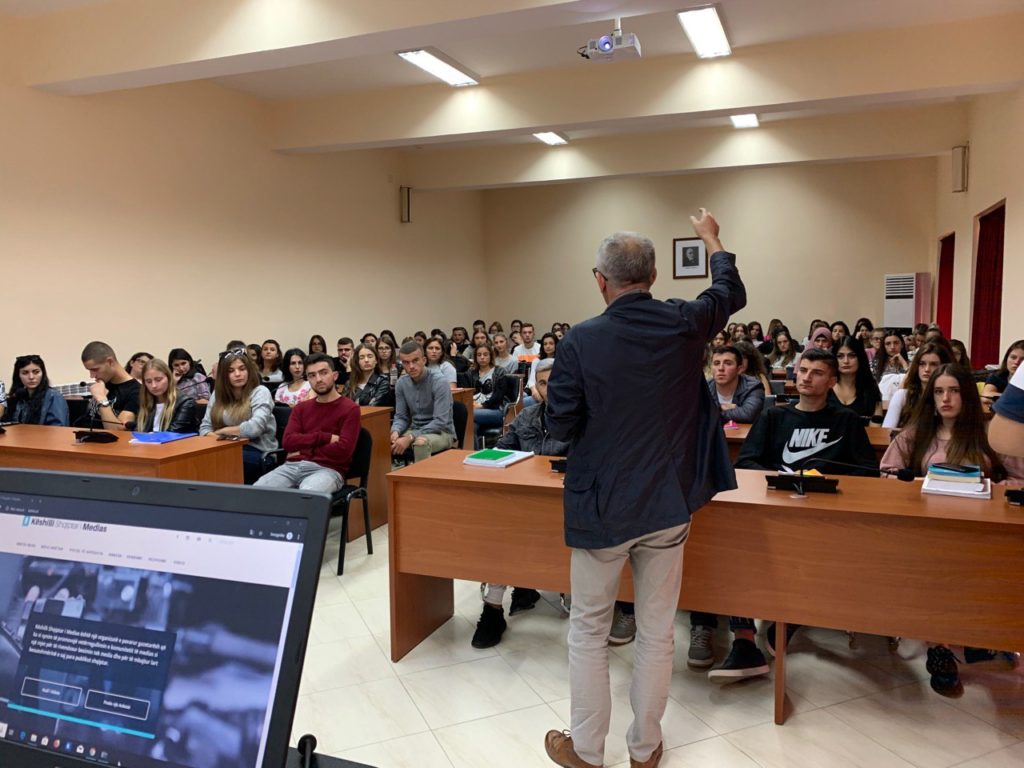
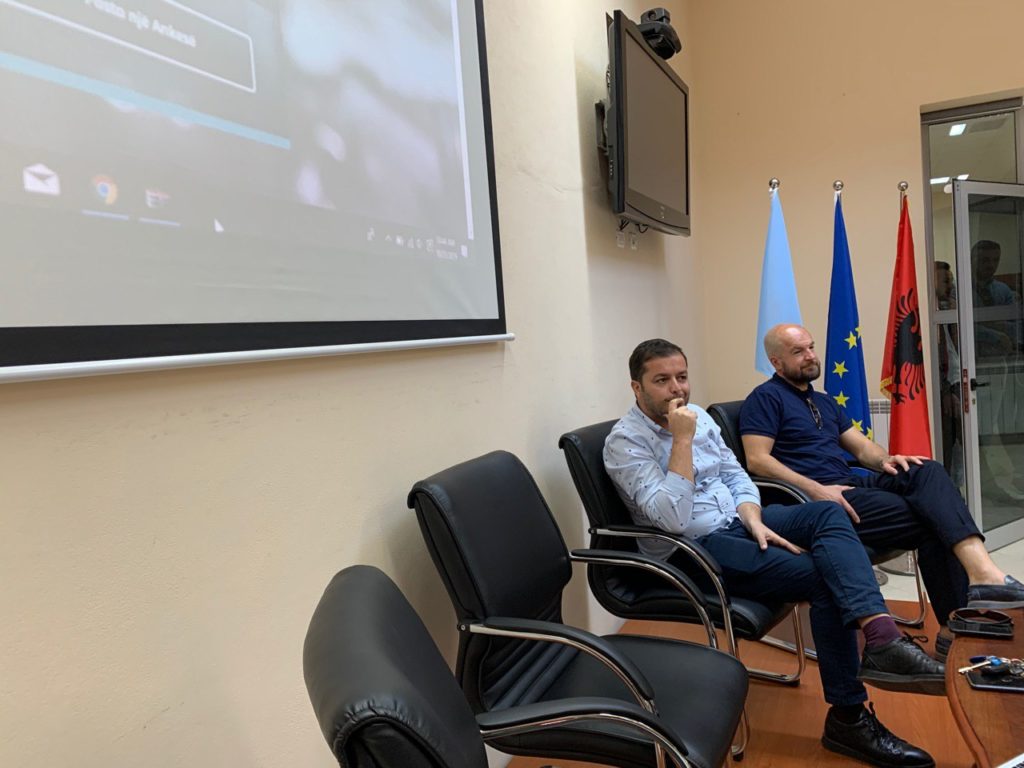
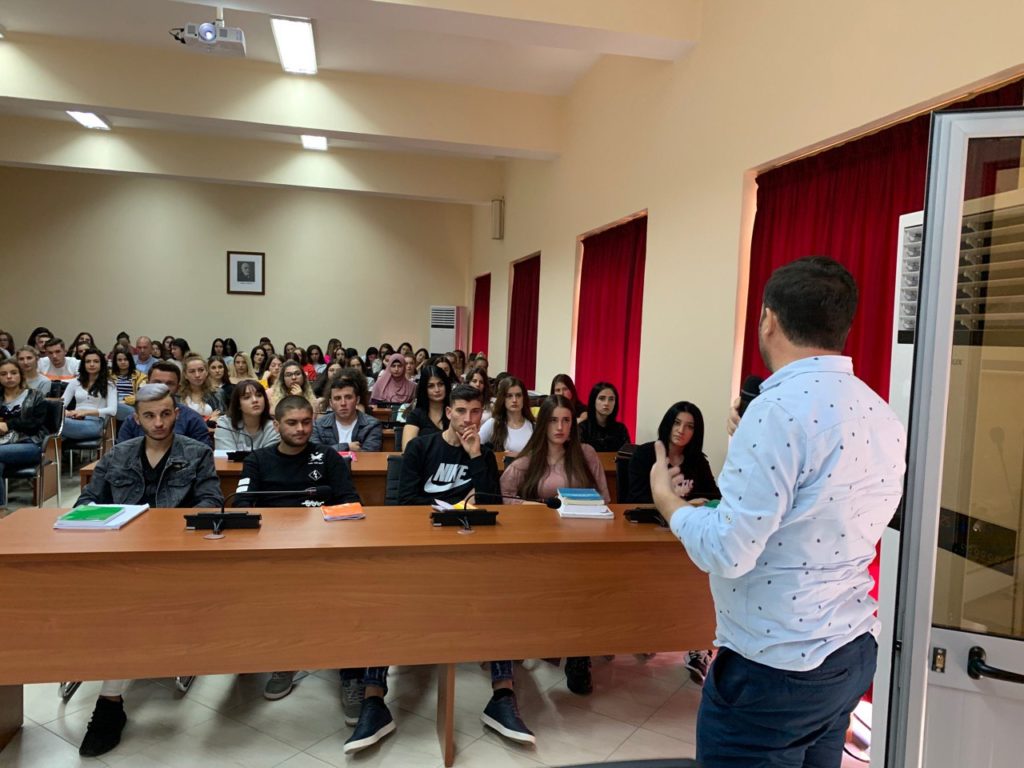
 AMC paid a visit today to the Channel News24’s newsroom, one of the oldest information television stations in the country, as part of a toru through Albanian media newsrooms. This visit was the first in a television newsroom, and moreover, a newsroom that “feeds” with news many portals and newspapers.The conversation included recent events related to ethics in the country, the situation of journalists, the responsibility for unethical journalism of the media owners.The conversation tackled the ethical question of whether the child’s identity should be prote
AMC paid a visit today to the Channel News24’s newsroom, one of the oldest information television stations in the country, as part of a toru through Albanian media newsrooms. This visit was the first in a television newsroom, and moreover, a newsroom that “feeds” with news many portals and newspapers.The conversation included recent events related to ethics in the country, the situation of journalists, the responsibility for unethical journalism of the media owners.The conversation tackled the ethical question of whether the child’s identity should be prote cted in the news if his/her life depended on this news. In the News 24 newsroom there were cases where the child’s parents sought the public’s help to crowdfund the medication of sick children, but in order to build credibility on these cases and to encite the empathy and citizen engagement, newsroom journalists were forced to reveal the image of the child. Mark Mark, an ethics expert, argued that the child’s life is the most important, and ethical violations (such as not revealing the child’s identity) can be circumvented in order to protect life. Journalist Klodiana Lala noted the declining quality of newsrooms, which employ unprepared and unread journalists. In relation to th
cted in the news if his/her life depended on this news. In the News 24 newsroom there were cases where the child’s parents sought the public’s help to crowdfund the medication of sick children, but in order to build credibility on these cases and to encite the empathy and citizen engagement, newsroom journalists were forced to reveal the image of the child. Mark Mark, an ethics expert, argued that the child’s life is the most important, and ethical violations (such as not revealing the child’s identity) can be circumvented in order to protect life. Journalist Klodiana Lala noted the declining quality of newsrooms, which employ unprepared and unread journalists. In relation to th e “ready-made tapes” produced by the City Hall, the Government and political parties, and broadcasted by television without being verified as news, the journalists stated that this is a problem caused by the owners and that the journalists are threatened with “job lose” . Regardless, the AMC said that the professional conduct asks of a journalist to resist if owners and editors
e “ready-made tapes” produced by the City Hall, the Government and political parties, and broadcasted by television without being verified as news, the journalists stated that this is a problem caused by the owners and that the journalists are threatened with “job lose” . Regardless, the AMC said that the professional conduct asks of a journalist to resist if owners and editors try to distort reporting, force them to produce unethical reporting, or pressure them to take away their independence.NEWS 24 journalists were very interested in joining the fight against media law, a law aimed at controlling the media from the Government through the AMA, using fines and sanctions on ethical issues.Visits to newsrooms, supported by OSFA’s media project, will continue in the coming weeks in other Albanian media outlets.
try to distort reporting, force them to produce unethical reporting, or pressure them to take away their independence.NEWS 24 journalists were very interested in joining the fight against media law, a law aimed at controlling the media from the Government through the AMA, using fines and sanctions on ethical issues.Visits to newsrooms, supported by OSFA’s media project, will continue in the coming weeks in other Albanian media outlets.


